2023届高考英语二轮复习表语从句与同位语从句课件(共16张PPT)
文档属性
| 名称 | 2023届高考英语二轮复习表语从句与同位语从句课件(共16张PPT) | 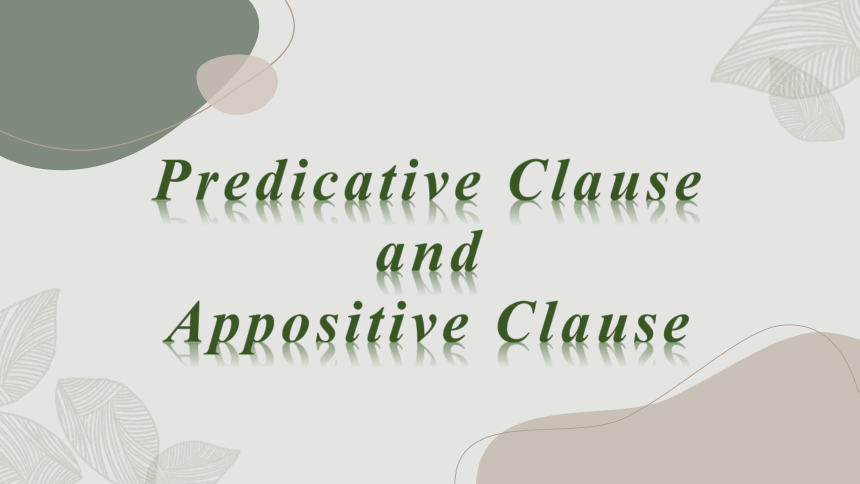 | |
| 格式 | pptx | ||
| 文件大小 | 767.5KB | ||
| 资源类型 | 教案 | ||
| 版本资源 | 通用版 | ||
| 科目 | 英语 | ||
| 更新时间 | 2023-02-24 21:07:56 | ||
图片预览

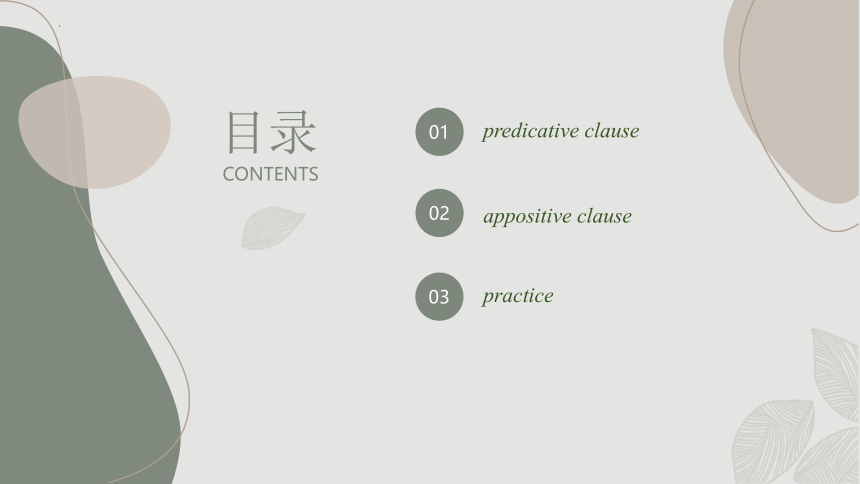
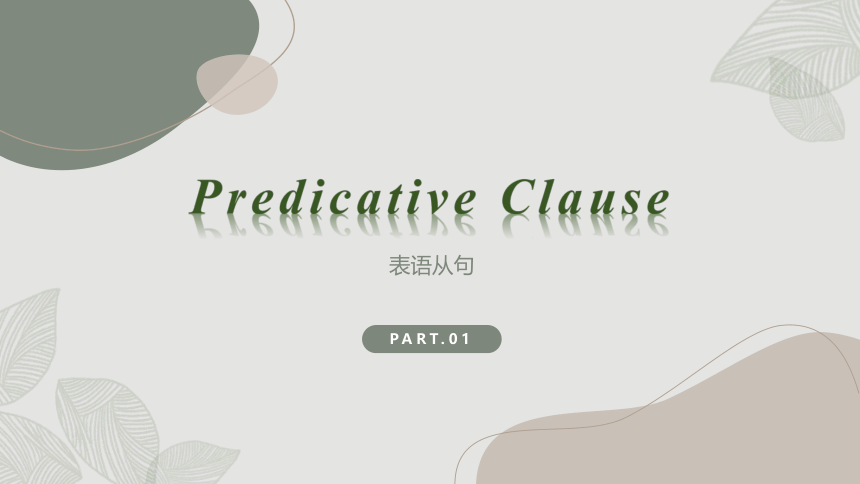
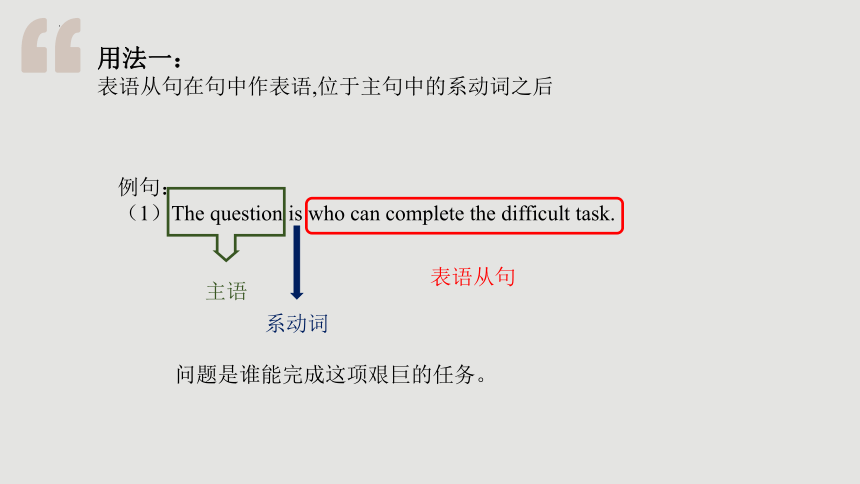
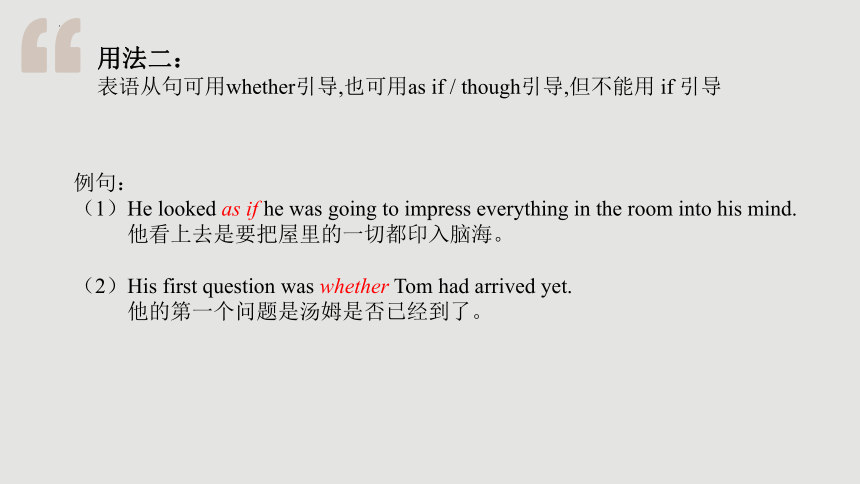

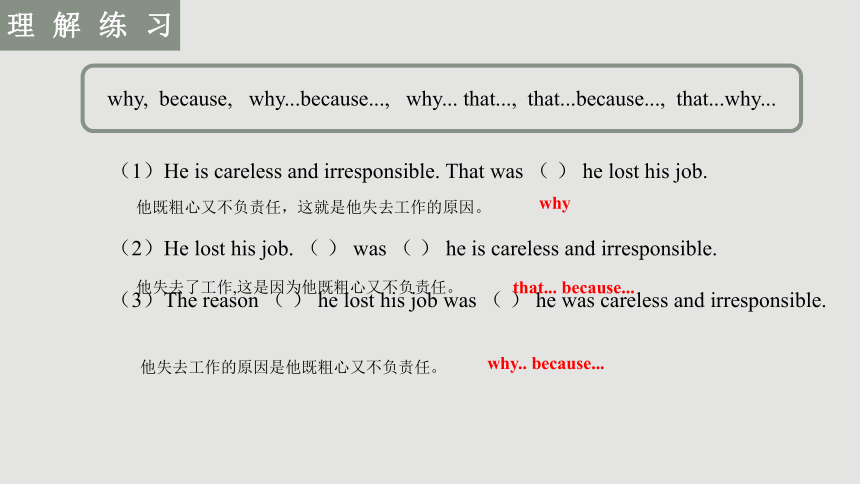
文档简介
(共16张PPT)
Predicative Clause
and
Appositive Clause
01
02
03
CONTENTS
目录
predicative clause
appositive clause
practice
表语从句
Predicative Clause
PART.01
用法一:
表语从句在句中作表语,位于主句中的系动词之后
例句:
(1)The question is who can complete the difficult task.
主语
系动词
表语从句
问题是谁能完成这项艰巨的任务。
用法二:
表语从句可用whether引导,也可用as if / though引导,但不能用 if 引导
例句:
(1)He looked as if he was going to impress everything in the room into his mind.
他看上去是要把屋里的一切都印入脑海。
(2)His first question was whether Tom had arrived yet.
他的第一个问题是汤姆是否已经到了。
用法三:
当主句的主语是 reason 时,表语从句的引导词要用that, 不能用 because
区分以下句式:
That’s why+结果;
That's because+原因;
The reason why/for... is/was that...
理解练习
(1)He is careless and irresponsible. That was ( ) he lost his job.
(2)He lost his job. ( ) was ( ) he is careless and irresponsible.
(3)The reason ( ) he lost his job was ( ) he was careless and irresponsible.
他既粗心又不负责任,这就是他失去工作的原因。
他失去了工作,这是因为他既粗心又不负责任。
他失去工作的原因是他既粗心又不负责任。
why, because, why...because..., why... that..., that...because..., that...why...
why
why.. because...
that... because...
Practice
It’s raining. That’s ( ) he stayed at home.
A. because B. what C. why D. reason
C
His question is ( ) Mary has arrived.
A. if B. that C. whether D. what
C
Judy looked ( ) her was shocked .
A. though B. that C. through D. as if
D
同位语从句
Appositive Clause
PART.02
下列名词后面可接同位语从句;
hope(希望) idea(想法) problem(问题) doubt(怀疑) promise(诺言)
fact(事实) thought(想法) suggestion (提议) evidence (迹象,证据) decision
(决定,决心)
news(消息 ) belief(信仰) question(问题) rumor(流言) conviction(确信)
message(消息) concept(观念) conclusion (结论) agreement (同意,协议) assumption
(假定,设想)
例句理解
The news that someone was killed yesterday shocked everyone
The problem that he doesn’t konw my telephone number should be considered.
I have no idea whether he will go back toninght.
His suggestion that we should set up advance is proved to be useful so much.
Try to make predicative clauses with other words in the table ...
引导同位语从句的词;
通常有连词 that, whether,连接副词how, when, where, why等。that引导同位语从句时通常不可省略; if和which不能引导同位语从句。
例句:
(1)The news that I have passed the exam is true.我通过考试的消息是真的。(that不可省略)
(2)I have no idea why she smiles. 我不知道她为什么笑。
(3)I have no idea when he will leave. 我不知道他什么时候会离开。
(4)We are not looking into the question whether he is worth trusting.
我们不是在调查“他是否值得信赖”这个问题。(whether不可换成if)
(5)I made a promise that if anyone set me free I would make him very rich.
我曾许诺,如果谁我自由,我就让他非常富有。
有时同位语从句可以不紧跟在它所说明的名词后,而被别的词语隔开;
例句:
(1) The thought came to her that maybe she had
left the door open when she left home.
她突然起她可能在离开家时没把门关上。
(2) Word came that he had been abroad.
据说他已经出国了
doubt 在否定句中带同位语从句时的引导词通常是that; 在肯定句中则一般用 whether;
例句:
(1)There is some doubt whether he will come on time.
人们怀疑他是否会准时来。(2)I have no doubt that he will finish it on time.
我绝对相信他会按时完成任务的。
Practice
There is no doubt ( ) the company has made a wrong decision.
A. why B. that C. whether D. when
B
Word came ( ) he had left to England.
There is some doubt ( ) he can pass the exam.
A. why B. that C. if D. whether
D
A. that B. when C. if D. what
A
Thank you for yuor listening!
Predicative Clause
and
Appositive Clause
01
02
03
CONTENTS
目录
predicative clause
appositive clause
practice
表语从句
Predicative Clause
PART.01
用法一:
表语从句在句中作表语,位于主句中的系动词之后
例句:
(1)The question is who can complete the difficult task.
主语
系动词
表语从句
问题是谁能完成这项艰巨的任务。
用法二:
表语从句可用whether引导,也可用as if / though引导,但不能用 if 引导
例句:
(1)He looked as if he was going to impress everything in the room into his mind.
他看上去是要把屋里的一切都印入脑海。
(2)His first question was whether Tom had arrived yet.
他的第一个问题是汤姆是否已经到了。
用法三:
当主句的主语是 reason 时,表语从句的引导词要用that, 不能用 because
区分以下句式:
That’s why+结果;
That's because+原因;
The reason why/for... is/was that...
理解练习
(1)He is careless and irresponsible. That was ( ) he lost his job.
(2)He lost his job. ( ) was ( ) he is careless and irresponsible.
(3)The reason ( ) he lost his job was ( ) he was careless and irresponsible.
他既粗心又不负责任,这就是他失去工作的原因。
他失去了工作,这是因为他既粗心又不负责任。
他失去工作的原因是他既粗心又不负责任。
why, because, why...because..., why... that..., that...because..., that...why...
why
why.. because...
that... because...
Practice
It’s raining. That’s ( ) he stayed at home.
A. because B. what C. why D. reason
C
His question is ( ) Mary has arrived.
A. if B. that C. whether D. what
C
Judy looked ( ) her was shocked .
A. though B. that C. through D. as if
D
同位语从句
Appositive Clause
PART.02
下列名词后面可接同位语从句;
hope(希望) idea(想法) problem(问题) doubt(怀疑) promise(诺言)
fact(事实) thought(想法) suggestion (提议) evidence (迹象,证据) decision
(决定,决心)
news(消息 ) belief(信仰) question(问题) rumor(流言) conviction(确信)
message(消息) concept(观念) conclusion (结论) agreement (同意,协议) assumption
(假定,设想)
例句理解
The news that someone was killed yesterday shocked everyone
The problem that he doesn’t konw my telephone number should be considered.
I have no idea whether he will go back toninght.
His suggestion that we should set up advance is proved to be useful so much.
Try to make predicative clauses with other words in the table ...
引导同位语从句的词;
通常有连词 that, whether,连接副词how, when, where, why等。that引导同位语从句时通常不可省略; if和which不能引导同位语从句。
例句:
(1)The news that I have passed the exam is true.我通过考试的消息是真的。(that不可省略)
(2)I have no idea why she smiles. 我不知道她为什么笑。
(3)I have no idea when he will leave. 我不知道他什么时候会离开。
(4)We are not looking into the question whether he is worth trusting.
我们不是在调查“他是否值得信赖”这个问题。(whether不可换成if)
(5)I made a promise that if anyone set me free I would make him very rich.
我曾许诺,如果谁我自由,我就让他非常富有。
有时同位语从句可以不紧跟在它所说明的名词后,而被别的词语隔开;
例句:
(1) The thought came to her that maybe she had
left the door open when she left home.
她突然起她可能在离开家时没把门关上。
(2) Word came that he had been abroad.
据说他已经出国了
doubt 在否定句中带同位语从句时的引导词通常是that; 在肯定句中则一般用 whether;
例句:
(1)There is some doubt whether he will come on time.
人们怀疑他是否会准时来。(2)I have no doubt that he will finish it on time.
我绝对相信他会按时完成任务的。
Practice
There is no doubt ( ) the company has made a wrong decision.
A. why B. that C. whether D. when
B
Word came ( ) he had left to England.
There is some doubt ( ) he can pass the exam.
A. why B. that C. if D. whether
D
A. that B. when C. if D. what
A
Thank you for yuor listening!
